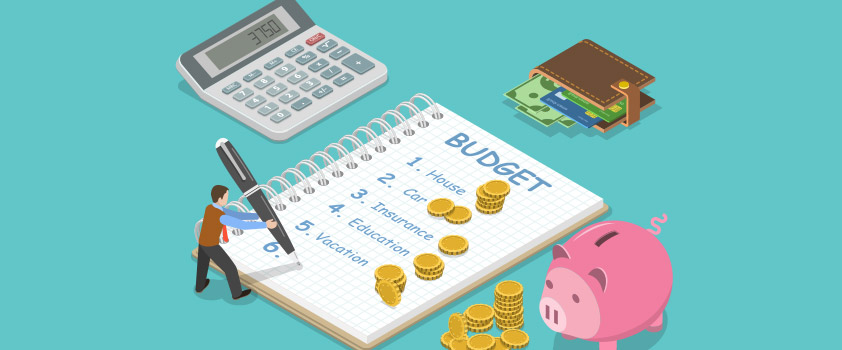Personal budget is a fundamental aspect of financial management that can significantly impact an individual’s financial health and long-term prosperity.
An efficient budget serves as a roadmap for your finances, helping you allocate resources effectively, achieve financial goals, and maintain control over your spending habits. This guide will walk you through the process of creating and maintaining a personal budget that works for your unique financial situation.

Understanding the Importance of Personal Budgeting
1.1 Financial Clarity and Control
A well-crafted budget provides a clear picture of your income and expenses, allowing you to take control of your financial life. It helps you understand where your money is going and identifies areas where you may be overspending or where you can potentially save more.
1.2 Goal Setting and Achievement
Budgeting is instrumental in setting and achieving financial goals. Whether you’re saving for a down payment on a house, planning for retirement, or aiming to pay off debt, a budget helps you allocate resources towards these objectives systematically.
1.3 Stress Reduction and Financial Peace of Mind
By providing a structured approach to managing your finances, a budget can significantly reduce financial stress. Knowing that you have a plan in place to meet your financial obligations and work towards your goals can bring peace of mind and improve overall well-being.
Gathering Financial Information
2.1 Income Assessment
Begin by calculating your total monthly income from all sources. This includes salary, freelance work, investments, and any other regular income streams. For irregular income, consider using an average based on the past 6-12 months.
2.2 Expense Tracking
Collect information on all your expenses over the past few months. This includes fixed expenses like rent or mortgage payments, utilities, and insurance premiums, as well as variable expenses such as groceries, entertainment, and discretionary spending.
2.3 Debt and Financial Obligations
Make a comprehensive list of all debts, including credit cards, personal loans, student loans, and any other financial obligations. Note the outstanding balances, interest rates, and minimum monthly payments for each.
Creating Your Personal Budget Framework
Choosing a Budgeting Method
Select a budgeting method that aligns with your financial style and goals. Popular methods include:
- Zero-based budgeting: Allocating every dollar of income to specific expenses or savings categories.
- 50/30/20 rule: Allocating 50% of income to needs, 30% to wants, and 20% to savings and debt repayment.
- Envelope system: Allocating cash to different spending categories in physical envelopes.
Categorizing Expenses
Organize your expenses into categories such as housing, transportation, food, utilities, entertainment, and savings. This categorization helps in analyzing spending patterns and identifying areas for potential cutbacks.
Setting Realistic Targets
Based on your income and financial goals, set realistic targets for each spending category. Ensure that your total expenses and savings do not exceed your income.
Implementing Your Budget
Select tools to help you implement and track your budget. Options range from simple spreadsheets to sophisticated budgeting apps and software. Choose a tool that you’re comfortable using and that provides the features you need.
Set up automatic transfers to your savings accounts and for bill payments. This ensures that you prioritize savings and meet your financial obligations consistently.
Schedule regular budget reviews (weekly or monthly) to track your progress and make necessary adjustments. Be prepared to fine-tune your budget as your financial situation or goals change.
Strategies for Sticking to Your Budget
Creating a Buffer for Unexpected Expenses
Allocate a portion of your budget to an emergency fund or buffer category to cover unexpected expenses. This helps prevent your budget from derailing when unforeseen costs arise.
Practicing Mindful Spending
Develop a habit of mindful spending by questioning purchases and distinguishing between needs and wants. This can help curb impulse buying and keep you aligned with your budgetary goals.
Involving Family Members
If you share finances with family members, involve them in the budgeting process. This creates a sense of shared responsibility and increases the likelihood of everyone adhering to the budget.
Overcoming Common Personal Budget Challenges
Dealing with Irregular Income: For those with fluctuating income, create a budget based on your lowest expected monthly income. In months with higher earnings, allocate the excess to savings or debt repayment.
Balancing Debt Repayment and Savings: Prioritize high-interest debt repayment while still allocating some funds to savings. As debts are paid off, gradually increase your savings allocation.
Adjusting for Life Changes: Be prepared to revise your budget in response to significant life changes such as marriage, having children, or changing jobs. Regular budget reviews will help you stay adaptable.
Creating and maintaining an efficient personal budget is a powerful tool for achieving financial stability and reaching your financial goals. While it requires initial effort and ongoing commitment, the benefits of budgeting far outweigh the challenges.
By following the steps and strategies outlined in this guide, you can develop a budget that not only reflects your current financial situation but also supports your long-term financial aspirations. Remember, budgeting is a skill that improves with practice, so be patient with yourself and stay committed to the process.
With time and consistency, you’ll find that your budget becomes an invaluable asset in your journey towards financial success and peace of mind.





